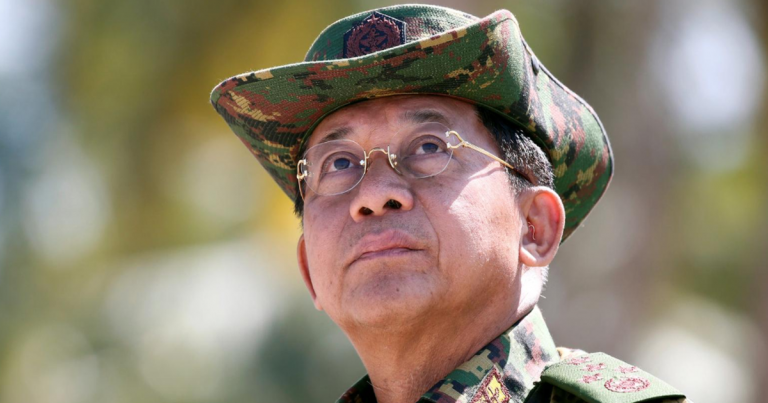
WASHINGTON (Reuters) – The United States on Tuesday imposed sanctions on four Myanmar military leaders, including the commander-in-chief, in the toughest action taken yet by Washington for alleged human rights abuses against the Rohingya and other minorities.
The sanctions targeted military chief Min Aung Hlaing on the same day that Myanmar’s civilian leader, Aung San Suu Kyi, attended the first day hearings at the U.N.’s highest court in The Hague, where she will lead Myanmar’s defense against the charge of genocide.
A 2017 military crackdown in Myanmar drove more than 730,000 Rohingya Muslims to flee to neighboring Bangladesh. United Nations investigators have said Myanmar’s operation included mass killings, gang rapes and widespread arson and was executed with “genocidal intent.”
Myanmar, formerly known as Burma, denied accusations of widespread abuses and said the military’s actions were part of a fight against terrorism.
The U.S Treasury Department said in a statement on Tuesday Burmese military forces had committed “serious human rights abuse” under Min Aung Hlaing’s command.
“During this time, members of ethnic minority groups were killed or injured by gunshot, often while fleeing, or by soldiers using large-bladed weapons; others were burned to death in their own houses,” the statement said.
MAGNITSKY ACT
The sanctions Tuesday were among a round of targets implemented under the Global Magnitsky Human Rights Accountability Act, which targets perpetrators of serious human rights abuses and corruption, marking International Human Rights Day.
The sanctions freeze any U.S. assets held by those targeted and prohibits Americans from doing business with them.
As well as the army chief, the sanctions targeted Min Aung Hlaing’s deputy, Soe Win, and two subordinates who headed the elite army divisions that spearheaded the crackdown on the Rohingya.
A Reuters special report last year detailed for the first time the leading role of the two units, the 33rd Light Infantry Division, led by Than Oo, and the 99th Light Infantry Division, led by Aung Aung, in the 2017 conflict.
The 33rd Light Infantry Division led military operations in the village of Inn Din, where Reuters exposed a massacre of 10 Rohingya men and boys by soldiers and Buddhist villagers. Two Reuters reporters that worked on the story were jailed for more than 500 days.
(Read Reuters Pulitzer Prize-winning series “Myanmar Burning” here: here)
It is not known whether the four generals, who were previously barred from entering the United States in July, have assets in the United States.
Myanmar’s embassy in Washington did not immediately respond to a request for comment.
The additional sanctions come months after Washington faced criticism by U.N. special rapport Yanghee Lee in July, who said the earlier travel ban was not enough.
John Sifton, Asia advocacy director for Human Rights Watch, called it a welcome but overdue step, saying “better late than never.”
“It is unfortunate the decision took so long. The crimes in question were incredibly serious,” he said. “If the EU follows suit with similar measures and works with the US to press other jurisdictions to crack down, soon the Myanmar military will find that their world is geographically and financially shrinking.”
The Treasury said the fresh sanctions were aimed at supporting a transition toward democracy in Myanmar, where Nobel laureate Suu Kyi came to power after landmark elections in 2015.
Suu Kyi is forced to share power with unelected generals over whom she has little control, but has remained popular at home despite international criticism over the Rohingya crisis.
Some analysts and diplomats have tipped Min Aung Hlaing as a potential presidential candidate in the next election in 2020, when Suu Kyi’s National League for Democracy is likely to face opposition from nationalists aligned with the military.
The U.S. action on Tuesday falls short of reimposing economic sanctions on Myanmar lifted after the military began loosening its grip on power. It does not target military-owned companies that dominate some sectors of Myanmar’s economy.
Mark Farmaner, director of Burma Campaign UK, an advocacy group, said these military-owned companies were still doing business with U.S. firms.
“Military-owned companies are helping to fund the genocide against the Rohingya. It is essential they face sanctions,” he told Reuters by email.





